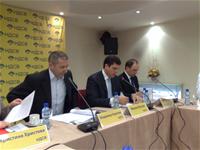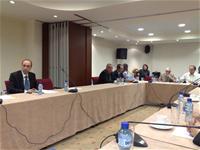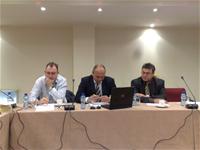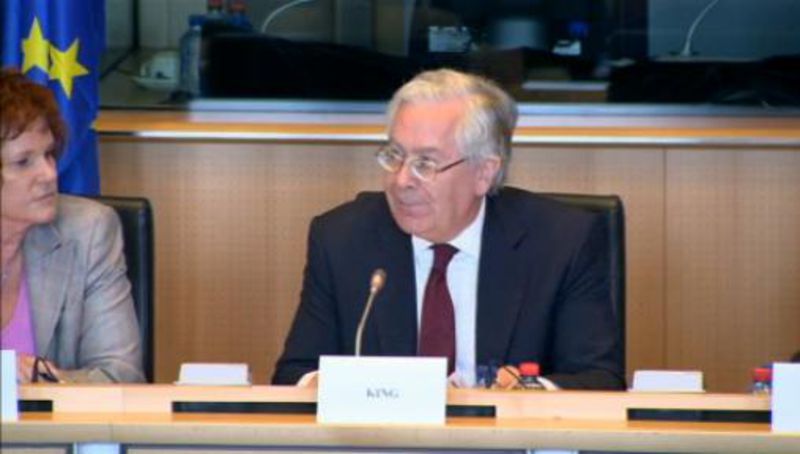It is high time the budget to become public
Adelina Marini, November 26, 2009
 This position united together independent economists and the members of the economic team of the NDSV (the party of the former Bulgarian tsar Simeon Saxecobourggotta, now outside parliament). At a discussion about Budget 2010 the former deputy finance minister Lyubomir Datsov said that the budget last month has been balanced on the 26th which means that 4 days of spending had been saved. To rely that this spending will be compensated next year by unexpected revenues is illogical, he said. His opinion about the accounting balancing of the budget was supported by the economist from the Centre for Liberal Strategies Georgi Ganev who said that it was high time the budget to calculated nominally and not only on an accounting basis.
This position united together independent economists and the members of the economic team of the NDSV (the party of the former Bulgarian tsar Simeon Saxecobourggotta, now outside parliament). At a discussion about Budget 2010 the former deputy finance minister Lyubomir Datsov said that the budget last month has been balanced on the 26th which means that 4 days of spending had been saved. To rely that this spending will be compensated next year by unexpected revenues is illogical, he said. His opinion about the accounting balancing of the budget was supported by the economist from the Centre for Liberal Strategies Georgi Ganev who said that it was high time the budget to calculated nominally and not only on an accounting basis.
He even suggested that this can happen next year. "Honestly speaking, if this can be done, you will again prove guilty (the ex-rulers). I think that they will have a political stimulus when the budget starts putting pressure on them, to do this, to publish it and again you will prove to be guilty for the current situation, which is a fact but, maybe, in the long-term it will be good the budget to be published", Georgi Ganev added.
The economic team of NDSV also criticised the unofficial and inaccurate information about the obligations of the state to the business. According to some business organisations the amount of the debt is 1.5 bn levs (0.76 mn euro) and according to other sources the sum is less than 1 bn levs. In all cases the yellow party called for more efforts the debt to be paid off by the end of the year even risking the budget to end with a deficit. The idea was supported by Mr. Ganev. However Georgi Angelov from the Open Society Institute said that it was impossible the debt to be 1.5 bn levs. He also said that whatever the sum was, a paying off and ending with a big deficit would be shocking for foreign observers.
Another dispute caused the idea for decrease of social securities burden. This time all economists shared single opinion, no matter whether they were politically bound or theoretics. There positions  varied only with regard to scale of the decrease. Against were the representatives of the trade unions. Mika Zaykova from the Confederation of Labour "Podkrepa" said that the union had a lot of reserves about the decrease of social securities because for the last 8 years such measures had been introduced with no significant increase of investments in high technologies that would lead to a tangible increase of competitiveness of Bulgarian goods.
varied only with regard to scale of the decrease. Against were the representatives of the trade unions. Mika Zaykova from the Confederation of Labour "Podkrepa" said that the union had a lot of reserves about the decrease of social securities because for the last 8 years such measures had been introduced with no significant increase of investments in high technologies that would lead to a tangible increase of competitiveness of Bulgarian goods.
She added that if, anyway, any decrease was introduced it should be conditional. Ms. Zaykova said that Bulgaria continued to gain competitiveness by offering cheap labour which was not good. The senior economist at the Open Society Institute Georgi Angelov commented that the decrease of social securities should even be greater, in spite of what the trade unions were saying because this had always been a successful policy. "Each decrease leads to positive results which are commensurable, visible and are included in the anti-crisis plan of the European Commission", the economist added. This measure was recommended as a working policy to boost labour markets and is now applied in 18 EU member states.
Mr. Angelov criticised the budget for 2010 which is to be approved by parliament on a second reading, because its volume is big. "The budget is bigger as a sum from this year's. What we see is cuts of all spendings to allow more money to be paid for pensions because pensions have been increased by 20% which is 3-4% of GDP. We have a seizure from all expenditure sectors to pay pensions. The government has not dared to abolish the increase of pensions which means, though, that all other sectors suffer. This is a political decision", he underlined.
 Georgi Angelov also focused on the still not kept promise of the government to make 15% cuts of administration, of which the less cuts are in the Ministry of the Interior where "for some reason no one is talking about reforms". The system of the Interior is too large in terms of employees and Bulgaria is the country with the largest number of policemen per capita. The problem with the low wages can easily be solves - less policemen with higher wages.
Georgi Angelov also focused on the still not kept promise of the government to make 15% cuts of administration, of which the less cuts are in the Ministry of the Interior where "for some reason no one is talking about reforms". The system of the Interior is too large in terms of employees and Bulgaria is the country with the largest number of policemen per capita. The problem with the low wages can easily be solves - less policemen with higher wages.
This problem the coordinator of the economic team of NDSV Vladimir Karolev called "policemanship", which he found in all 160 pages of the governing programme of the government. He also criticised the lack of binding of ideas with concrete terms and methods of achievement. The former finance minister Plamen Oresharski, although his party (BSP - Bulgarian Socialist Party) refused to debate the budget in parliament, also criticised the lack not only of concrete terms but also of financial support for the priorities. "In the priorities in the expenditure part of the budget I cannot find only the defense", Mr. Oresharski exclaimed.
Most of the participants at the discussion did not approve the planned increase of the excise for cigarettes and alcohol. Milen Velchev, who was a finance minister in the government of Simeon Saxecobourggotta (2001-2005) supported the increase but not "before we are certain that the reforms in the customs administration will guarantee that this would not lead to stimulating the smuggling". A much more important issue is the social securities, added Mr. Velchev. Plamen Oresharski on his behalf asked who this excise increase supported given the structure of the increase - the cheapest cigarettes will become 2 times more expensive that the most expensive right now. Besides, he added, why the beer was not included in the increase of alcohol excise?
The NDSV also criticised the increase of the redistribution of the GDP - 42.3% even before the  promised 150 mn levs for agriculture to be included as well as the 450 mn levs for healthcare. The yellow party recalled that one of the pre-election promises of the ruling party GERB was to decrease the redistribution to 35% of GDP.
promised 150 mn levs for agriculture to be included as well as the 450 mn levs for healthcare. The yellow party recalled that one of the pre-election promises of the ruling party GERB was to decrease the redistribution to 35% of GDP.
Everyone at the discussion agreed that in times of crises it was best to start reforms. The NDSV, which have a congress on Saturday to elect a new party leader, pointed out numerous contradictions in the governing programme of the government. Vladimir Karolev was mostly outraged of the fact that there were only 2-3 sentences about privatisation in the programme and a total lack of the word concession.
Asked by euinside whether the word concession had turned into dirty phrasing after the several failures for a concession of highways in Bulgaria during the 8-year long presence of NDSV in government, Mr. Karolev explained that the "Trakiya" highway could had been built on a concession long time ago if it hadn't dropped dead in the election campaign of 2005. He recalled that the concession agreement was already made public by the Ministry of Regional Development and it could be seen that there was no fraud in the deal. The former minister of state administration Nikolay Vassilev reminded how many times the NDSV had called for concessions of ports, airports and highways but the coalition partners would either behave indecisively or would disagree.
Lyubomir Datsov concluded that for Bulgaria there was no other way that concession and public procurement because for at least the last 15 years there is shortage of public financing He reminded that the former government had filed a bill about public procurement which was now in the files department pf parliament. He called the bill to be withdrawn and filed again so that the opportunity of public procurement could be opened again.
 | © European Union
| © European Union | © European Union
| © European Union | © European Union
| © European Union